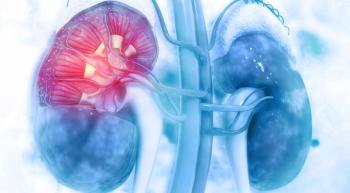
- April 2015
- Volume 9
- Issue 3
Staying Positive and on Course, Despite Financial Hardships
Please enjoy this music while your party is reached … "Hello, Mr. Freeman,* this is Venteria Knight. I'm a nurse navigator with Northside Hospital, and we met at the prostate cancer screening last week."
Venteria L. Knight, RN, MPH
Please enjoy this music while your party is reached … “Hello, Mr. Freeman,* this is Venteria Knight. I’m a nurse navigator with Northside Hospital, and we met at the prostate cancer screening last week.”
“Yes, I remember you, and you were nice and all, but I was hoping I didn’t have to hear your voice ever again,” he uttered with nervous laughter. “You said that if everything was okay, that I would just get a letter in the mail, but you’re calling me so there must be something wrong. Tell me, how long do I have; I’m a man, I can take it.”
We laugh together. “Yes, I said I would call if something was abnormal, but I also said don’t panic when I call, that my call doesn’t mean you have cancer—it just means further follow-up is needed. We have mailed your results, but I wanted to call and give you a heads-up that your PSA was elevated at 60.4. Normal is 0-4.”
“I don’t have health insurance. I don’t know what I’m going to do,” his comedic tone now serious and sullen. We discussed what his options were for assistance, and I assured him that despite his insurance status we could help.
A couple of weeks after this process started, Mr. Freeman called and said that he was facing eviction. His work as a traveling artist was unsteady, but this was the season where work was available and he was choosing to work to pay his rent, car payment, and for food for himself and his dogs. I educated him on the importance of this follow-up, particularly with the risk factors of his age, race, and family history, but my last words to him were …”If you change your mind, it’s okay to call me. I’m here if you need me.”
This was in 2011.
Take 2
Fast forward 1 year later. Mr. Freeman called back and said, “Throughout my travels I met several people who had prostate cancer, and their PSA was lower than mine. I’m concerned and I need your help.”
Helen, the GU nurse navigator, and I met with him when he came for a repeat PSA prior to scheduling his biopsy. Helen provided patient education, I discussed resources, and together, she and I made sure that he was equipped with the knowledge to make an informed decision. At the end of this visit, Mr. Freeman said, “Wow…you guys are making me feel like a celebrity, I feel like I can say ‘have your people, call my people.’ We all shared a laugh.
Additional Resources for Financial Support
- AmericanCancerSociety.org
- CaringBridge.org
- Needymeds.org
- PatientAdvocate.org
- CancerCare.org
Mr. Freeman was diagnosed with prostate cancer and treated with radiation and leuprolide. During treatment, he experienced several financial hardships. He did end up losing his home and started living out of his car; his car broke down, hindering his ability to get to appointments; and, there was no work available. He literally became a “starving artist.” He communicated with Helen and I regularly about treatment, other issues, and sometimes just to talk.
Take 3
Despite this tumultuous ride, he continued to laugh, joke, and handle each obstacle with a cheerful spirit. In our last conversation, when he was finally finished with treatment, he said, “When I first met my navigators—my team—I really thought I was the only patient you had because I was made to feel important and that my questions mattered. Now that I realize how many people you all help, I’m even more amazed because I wasn’t your only patient, and to this day you all are still “my people!” This was in 2014.
The moral of this story is that sometimes as nurses we tend to take things to heart and to our homes when we are unable to help someone, especially when we know they really need it. Yet sometimes people don’t want—or are not ready—for our help when we think they need it. Sometimes the best way that we can help our patients is simply by letting them know we are here when they are ready.
If you inform them, they will come…
*pseudonym
Venteria L. Knight, RN, MPH, has been an oncology nurse navigator specializing in disparities, community outreach, and education for more than 4 years with Northside Hospital Cancer Institute in Atlanta, Georgia. In 2012, she was nominated for the March of Dimes Oncology Nurse of the Year award for her work with uninsured and underinsured individuals with cancer.
Articles in this issue
almost 11 years ago
Daily Spiritual Experiences in Nursing Care and Researchalmost 11 years ago
Meeting the Complex Needs of Patients With Pancreatic Canceralmost 11 years ago
Anal Cancer in HIV-Infected Individualsalmost 11 years ago
My Worst Nightmare: A Spelling Bee With Only Oncology Drug Namesalmost 11 years ago
Professional Groups Unite to Make Safe Chemo Handling a Priority in PracticeNewsletter
Knowledge is power. Don’t miss the most recent breakthroughs in cancer care.





































